

David Rooney
I am interested in knowledge economies, knowledge societies and wisdom
Aristotle. Aristotle's views on physical science profoundly shaped medieval scholarship.
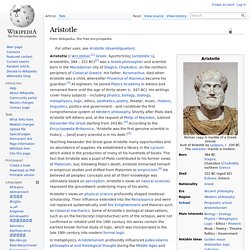
Their influence extended into the Renaissance and were not replaced systematically until the Enlightenment and theories such as classical mechanics. Some of Aristotle's zoological observations, such as on the hectocotyl (reproductive) arm of the octopus, were not confirmed or refuted until the 19th century. His works contain the earliest known formal study of logic, which was incorporated in the late 19th century into modern formal logic. His ethics, though always influential, gained renewed interest with the modern advent of virtue ethics.
All aspects of Aristotle's philosophy continue to be the object of active academic study today. The sum of his work's influence often ranks him among the world's top personalities of all time with the greatest influence, along with his teacher Plato, and his pupil Alexander the Great.[9][10] Life. Philosophers: Alphabetical Index. Aristotle Quotes. We become just by performing just actions, temperate by performing temperate actions, brave by performing brave actions.

ARISTOTLE, Nicomachean Ethics As for the story, whether the poet takes it ready made or constructs it for himself, he should first sketch its general outline, and then fill in the episodes and amplify in detail. Poverty is the parent of revolution and crime. If you string together a set of speeches expressive of character, and well finished in point and diction and thought, you will not produce the essential tragic effect nearly so well as with a play which, however deficient in these respects, yet has a plot and artistically constructed incidents. The Theory of Knowledge. The Theory of Knowledge The Theory of KnowledgeWhat is Scientific Method?
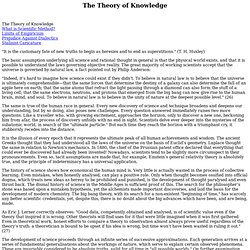
Limits of EmpiricismPrejudice Against DialecticsStalinist Caricature "It is the customary fate of new truths to begin as heresies and to end as superstitions. " (T. H. Marc Luyckx Ghisi - Knowledge economy. Knowledge Policy News: June 2012. See on Scoop.it – Knowledge Economy Somewhere in the mid-1980s, participation ascended to the pantheon of development buzzwords, catchphrases, and euphemisms.
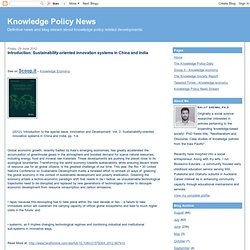
From that moment on, and throughout the greater part of the 1990s, the new buzzword would stand side by side with such giants as ‘sustainable development’, ‘basic needs’, ‘capacity building’, and ‘results based’. Participation entered the exclusive world of dominant development discourse; it had gained currency and trade value in the competitive market struggle for development project contracts, an indispensable ingredient of the replies to requests for proposals that issued from multilateral aid agencies everywhere. Development professionals and consultants rushed to attend workshops on how to employ a multiplicity of methodological packages such as Participatory Rural Appraisal (PRA), Participatory Learning and Action (PLA), Appreciative Inquiry (AI), Community Based Needs Assessment (CBNA), and Stakeholder Analysis. Social Network Analysis. Data visualization and analysis application: Challenger.
Mind Mapping. Mind Mapping Software, Brainstorming, GTD and Knowledgebase Software. Leximancer: From Words to Meaning to Insight. Leximancer: From Words to Meaning to Insight. NodeXL. The simplest, easiest way to get insights into networks, try the free and open NodeXL!
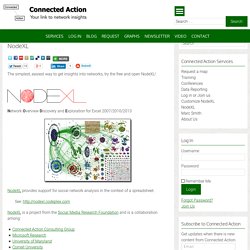
Network Overview Discovery and Exploration for Excel 2007/2010/2013 NodeXL provides support for social network analysis in the context of a spreadsheet. See: NodeXL is a project from the Social Media Research Foundation and is a collaboration among: NodeXL is the free and open add-in for Excel that supports network overview, discovery and exploration. NodeXL requires Office 2007, 2010 or 2013. A video tutorial for NodeXL can be found at: A book Analyzing Social Media Networks with NodeXL: Insights from a connected world is available from Morgan-Kaufmann: Analyzing Social Media Networks with NodeXL: Insights from a Connected World Supporting documentation can be found at Data sets and other teaching materials are available at Information about NodeXL can often be found on the Connected Action blog ( A recent slide deck describing NodeXL can be found at: Social Media Research Related Publications.
Knowledge management. Knowledge management. Knowledge management (KM) is the process of capturing, developing, sharing, and effectively using organizational knowledge.[1] It refers to a multi-disciplined approach to achieving organisational objectives by making the best use of knowledge.[2] An established discipline since 1991 (see Nonaka 1991), KM includes courses taught in the fields of business administration, information systems, management, and library and information sciences.[3][4] More recently, other fields have started contributing to KM research; these include information and media, computer science, public health, and public policy.[5] Columbia University and Kent State University offer dedicated Master of Science degrees in Knowledge Management.[6][7][8] History[edit] In 1999, the term personal knowledge management was introduced; it refers to the management of knowledge at the individual level.[14] Research[edit] Dimensions[edit]
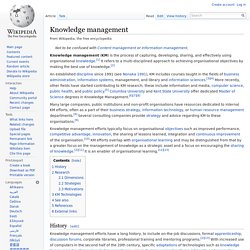
A site devoted to wisdom resources. Barry Schwartz on our loss of wisdom. Knowledge to Wisdom. Ulife - University of Toronto. Friends of Wisdom is an association of people sympathetic to the idea that academic inquiry should help humanity acquire more wisdom by rational means.
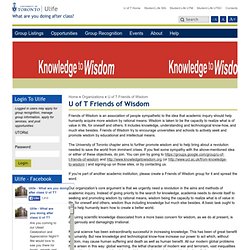
Wisdom is taken to be the capacity to realize what is of value in life, for oneself and others. It includes knowledge, understanding and technological know-how, and much else besides. Friends of Wisdom try to encourage universities and schools to actively seek and promote wisdom by educational and intellectual means. The University of Toronto chapter aims to further promote wisdom and to help bring about a revolution needed to save the world from imminent crises.
If you feel some sympathy with the above-mentioned idea or either of these objectives, do join. If you're part of another academic institution, please create a Friends of Wisdom group for it and spread the word. Our organization's core argument is that we urgently need a revolution in the aims and methods of academic inquiry. These changes are not arbitrary. A Project of the University of Chicago.